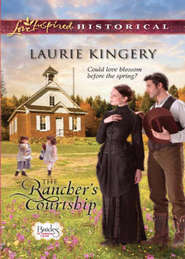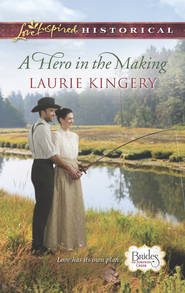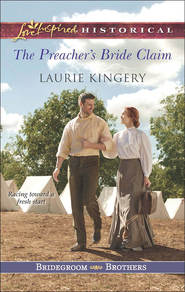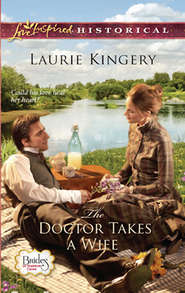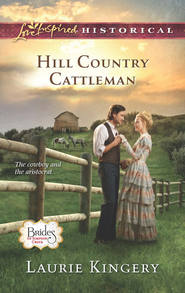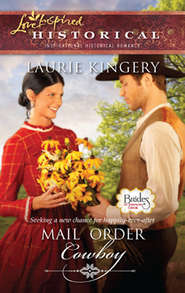По всем вопросам обращайтесь на: info@litportal.ru
(©) 2003-2024.
✖
The Sheriff's Sweetheart
Настройки чтения
Размер шрифта
Высота строк
Поля
“Are you sure?” At his quick nod, she turned to her father. “Oh, Papa, may I?” she said. “It would be so nice to have a dog, now—” She stopped, not wanting to say, Now that Mama is gone. She’d never been able to have a dog before because they made her mother sneeze. Oh, what she wouldn’t give to take back all the times she’d complained to her mother about not being able to have one.
Her father hesitated, glanced at Bishop, then said, “Only if he doesn’t chase Flora’s cat—Flora’s our housekeeper and cook, Mr. Bishop. And his care—including any—” he cleared his throat “—accidents he might have, is entirely your responsibility, not hers. Understood, daughter?”
She nodded and ruffled the dog’s ears, then turned back to Sam. “If I’m to keep him, he’ll need a proper name. What town did you find him in, Mr. Bishop?”
“Sam,” he insisted. “And I found him in Houston.”
She blinked. Houston was considerably farther than “a few miles back down the road,” as he had said. But surely it would be quibbling to point that out.
“Houston it is, then.” She leaned over and spoke into the dog’s ear. “Do you like your new name, Houston?”
The dog yipped and licked her face. Everyone—including Sam Bishop—laughed.
Prissy, flushed with pleasure, decided to try her luck still further. “Papa, perhaps we should invite Mr. Bishop to supper. Surely on his first night in Simpson Creek he shouldn’t have to dine by himself at the hotel.”
“That’s very nice of you, Miss Gilmore, but I couldn’t impose,” Sam Bishop said quickly, darting an apologetic look at her father. “I’m sure the hotel’s food will suit me fine.”
Prissy realized she shouldn’t have put her father on the spot as she had, but surprisingly, he came to her aid. “Nonsense. It’s no imposition, Bishop,” he said. “Flora usually cooks enough food for an army, as I know to my cost,” he said, patting his paunch ruefully. “We seldom have company anymore, so this would be a nice opportunity to get to know you better. Come at six, and you can see how your little dog is settling in. It’s the big house diagonally across from the hotel.”
He took off his hat and bowed. “Mayor Gilmore, I’d be honored. Miss Gilmore, until later.”
She inclined her head with what she hoped was regal dignity, trying to hide the unladylike excitement surging through her veins like Fourth of July fireworks over this new prospect for the ladies of Simpson Creek.
“Oh, Papa, you’re the best father anyone could ever want!” she cried, after they walked out of earshot toward Gilmore House. “Thank you for letting me keep the dog, and for seconding my invitation as you did. I know I should have asked you privately first.”
Her father patted her shoulder. “You don’t demand much, daughter, and maybe the dog will be good company for us.” But her father’s worn, jowly face suddenly turned stern. “But as for Bishop, I’m letting him come to our table so I can look him over, Priscilla. We don’t know him all that well, so don’t you go flirting with him any more till I get a chance to see what he’s made of. I won’t have any man thinking you’re forward.”
“Papa! I was not flirting! I was merely welcoming him…” The denial that had sprung easily to her lips died away, and obedience took its place. “But don’t worry. I won’t do anything to make you worry. Sam—Mr. Bishop, that is—he was just so friendly, and so handsome.”
Her father harrumphed. “Don’t assume anything about a man you just met.” He laughed as the dog yipped again, and his face softened. “See, your dog agrees with me.”
Prissy smiled at her father, but she had a strange feeling that Sam Bishop was exactly what Simpson Creek—and she herself—needed.
“Papa, didn’t you fall in love with Mama at first sight?” Prissy asked softly.
He sighed. “Aren’t you an imp, to remind me of my own actions! Your mother should have never told you that. But remember, she was a preacher’s daughter…”
Chapter Two
So Prissy lived in the very mansion he’d admired on his arrival. Thunderation, but fortune was smiling down on him now!
He straightened after he tied his mount’s reins to the hitching post outside the jail, and found Brookfield studying him again. The Englishman’s gaze was penetrating—too penetrating. It was as if he could see straight through Sam and into his not-so-admirable past.
“You watch yourself with Miss Prissy—Miss Priscilla, that is,” he told Sam, and those eyes were as chill as the winds of a Texas blue norther. “Don’t even think of trifling with her, or make no mistake, you’ll wish you’d never ridden into Simpson Creek.”
“You have nothing to worry about, Mr. Brookfield,” Sam said, deliberately using “mister” instead of “sheriff” to subtly remind the other man he was no longer acting sheriff. “I find Miss Gilmore charming—who wouldn’t? She seems to like me, too. But just what is it you don’t like about me?” he said. It was best to get it out in the open, so he could counter it.
“I don’t dislike you, Bishop, but I don’t think you’re being entirely honest about why you’ve come.”
Uh-oh. He’d have to tread carefully here. “I came because of the advertisement,” he said. That much was true, at least. He had come because of an advertisement—Priscilla’s ad for the Society for the Promotion of Marriage.
“Where’d you see it?”
Sam said a quick prayer to the deity he hadn’t paid much attention to in a long while. “In a Houston newspaper,” he said, hoping vagueness would suffice.
Brookfield gave him a look he couldn’t read. “Bring your saddlebags and come inside. I’ll show you the jail and your quarters behind it. Then we’ll take your horse down to the livery and we’ll take a little walk around town so I can introduce you to folks.”
The jail looked much as he’d expected; two cells and a desk, with a rack next to the door holding a pair of rifles and a couple of pistols, boxes of bullets beneath. A short hallway between the two cells led to a door that opened into his private quarters—as he’d expected, nothing palatial, just a room with a bed and another room with a table and two chairs and a cabinet, but no stove. Apparently even his morning coffee would have to be obtained at the hotel. He dropped his gear on the table.
Seventy-five dollars a month. He’d made that much and more in one night of card playing. Well, at least here he wouldn’t be dealing with sore losers like Raney. And he’d have the chance to woo the lovely Prissy…
“So how does an Englishman come to be living in a small Texas town?” he asked as they walked back outside, down a side street to the livery, leading Sam’s black gelding.
Brookfield gave him another of his inscrutable looks. “It’s a long story,” he said.
It seemed he was going to leave it at that, which made Sam curious. Did the Englishman have a past he wasn’t proud of, too? Interesting. “Sorry. Didn’t mean to pry,” he said.
Brookfield gave him a sidelong glance. “It’s I who should apologize,” he said in his formal way. “I didn’t intend to sound churlish.”
Sam wasn’t sure what “churlish” meant but he was relieved Brookfield seemed to be thawing a little.
“It’s no secret, I suppose,” Brookfield said. “I came to Texas to take a post at the embassy office in the capital, took a side trip to Simpson Creek, and met my wife, Milly. Now I’m a rancher instead of an embassy attaché. Life takes interesting turns, does it not?”
“That’s a fact,” Sam agreed. He wondered more about what Bishop had not said than what he had. Why would an Englishman take a side trip to a little backwater town like Simpson Creek? But Sam knew better than to probe further. He’d already irked the Englishman—perhaps it was best to douse his curiosity. After all, the code of the West dictated a man’s past was his private business, if he wanted it to be.
“Here’s the livery,” Brookfield announced as they came to a large barn and corral, in which several horses stood, tails swishing. “Run by the Calhoun brothers, now that their father’s died in the epidemic. Hello, Calvin,” he said when a tow-headed youth came forward out of the shadows of the barn. “Meet Sam Bishop, the new sheriff. Calvin will take good care of your horse.”
“I sure will. Pleased t’meet ya,” the boy said, and took the gelding’s reins, leading him into the box stall nearest the door.
Before Sam could reply, shots rang out. He and Nick spun around to see a man sprinting toward them.
“Sheriff! Thank God I’ve found you! Ol’ Delbert’s liquored up again, an’ shootin’ out th’ mirror and th’ lights!” he shouted as he neared them.
Brookfield didn’t take time to explain he was no longer the sheriff. “Is everyone all right?”
“Yup, George took cover behind the bar an’ everyone else went out th’ back door. Delbert ain’t mad at anyone, he’s just had too much rotgut is all,” the man said, and surprised Sam by grinning. “Reckon you kin talk some sense inta him like always.”
“Right. Come on, Bishop, it’s time to make your first arrest. Delbert Perry isn’t very dangerous,” Brookfield told Sam as they ran toward the saloon, “once we take his pistol away, of course. He just needs some time to sleep it off.”
There went his dinner with the lovely Prissy and her father, Sam thought, because once he had the man in custody, he’d have to remain at the jail. Perhaps Nick could make his excuses for him. He hoped Prissy wouldn’t be too offended. It was not exactly the best way to start his campaign to woo her.
They stopped in front of the hotel that sat diagonally across the street from the saloon. “I’ll go in from the back and cover you,” Nick said, motioning in that direction. “Just be firm with him. He usually surrenders as soon as he sees the badge,” he said, pointing to the tin star Sam now wore.
Sam wasn’t so sure. He’d seen dozens of intoxicated men in saloons who were dangerously unpredictable, especially if they were armed as well as drunk. He wasn’t about to sacrifice his life to keep such a man alive. If this Delbert fellow acted the least bit like he was going to shoot, Sam intended to drop him with the pistol he now held, a Colt he had purchased in the first town he arrived in after Dallas when he’d fled Houston.
They crossed the street cautiously at an oblique angle, heading for the near corner of the building. There they separated, Nick creeping around to the back to the exit, Sam hugging the front of the establishment, crouching low so his head didn’t show in the dusty, fly-specked glass windows. When he reached the batwing doors, he straightened and peered over the nearer of the two.
Within the dim, smoky interior of the saloon he spotted a wild-haired man staggering unsteadily around, clutching a half-empty bottle with one hand, a pistol with the other. Silver shards of what had been a full-length mirror littered the mahogany bar. Delbert Perry’s boots crunched the broken glass from the ruined chandeliers and a half-dozen bottles and glasses. The burnt smell of spent gunpowder filled Sam’s nostrils and stung his eyes.






